Climbing an Unconquered Mountain: The Challenges of Creating a Game Alone
- Transfer
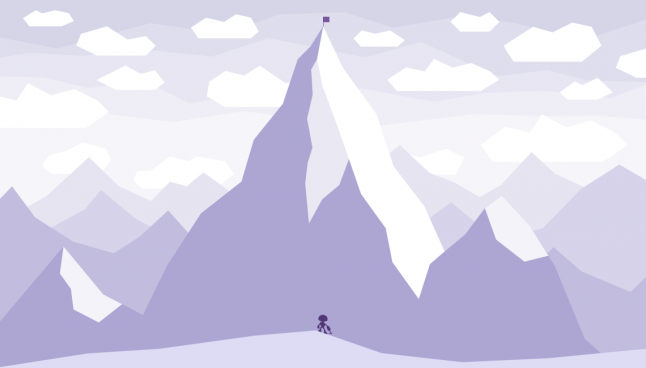
Making video games is difficult. But it’s even more difficult to do them alone.
But when most people hear this, they think it means technical complexity, art problems, difficulty gaining popularity, etc. All this is true, but one of the most difficult problems that are not remembered is loneliness and emotional stress from independently going this way.
This article is intended for developers embarking on a solo journey, as well as for those who have long been on the road and trying to release their first solo project.
Jumping alone
Have you ever stood on the edge of a steep cliff, hesitating before jumping into the water far below? Remember that in such a situation, people almost always decide to jump together? The hardest part of creating a video game alone is to make such a jump alone.

We are holding hands so that some wise guy does not pretend that he is jumping and does not scare at the last moment.
The decision to start my project took me a lot of time. I had a lot of doubts. Most of my professional career I worked as a designer, so I was most worried about whether I could handle other aspects of development. Will I cope with programming? Will it be possible to draw good graphics? Will you be able to collect everything on time?
One of the articles that helped me jump off a cliff was Fake Grimlock: Win Like Stupid .
The picture from this article describes it well in general:
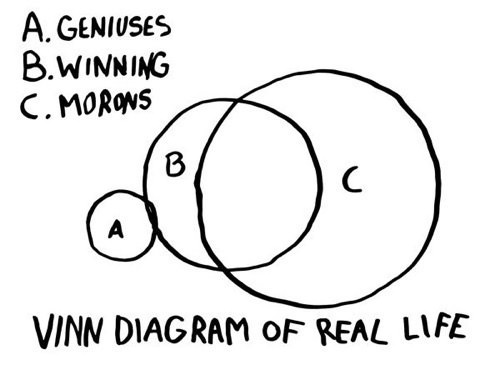
The Venn diagram on how to win in life. The whole article is also worth reading.
To get the courage for the first step, you need to act stupidly, in the sense that you should not let your brain think through all the reasons why an idea may not work, and instead just act.
When I finally decided to quit my job in San Francisco and go back to Europe to release my own game, my initial plan was pretty simple. Create a small mobile game in 3-6 months, make a bunch of mistakes, learn from them and start a new project. I thought the second time the cycle would be faster and better, and I would have a much better chance of success.
In theory, everything sounds great, right? In practice, I spent so much time on my first Hang Line game that I was not even able to fulfill my plan! But more on this below.
Finally, I took a jump, and the next difficult step was the choice of concept. The good thing is that you can choose literally everything, because your decision will affect only you. The bad news is that this makes the choice huge! This brings us to the next problem of creating games alone.
Paralysis of Choice
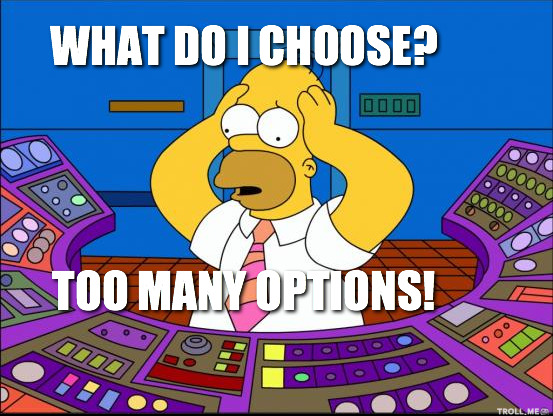
Most often, during the development process, I felt like Homer.
When working in a team, you rarely have to make decisions completely yourself, especially when you are a designer. Almost everyone in the team has their own opinion, and if you are in a leadership position, your task usually is to choose a good compromise between all these opinions. Leads usually make their decisions based on reliable feedback from colleagues.
When you work alone, you have no one to ask for feedback and no one to point out errors ... You are alone. All responsibility rests with you.
This can make decision making incredibly difficult, and perhaps the most important one will be WHAT A GAME TO DO AT ALL? Faced with endless possibilities, you may be paralyzed.
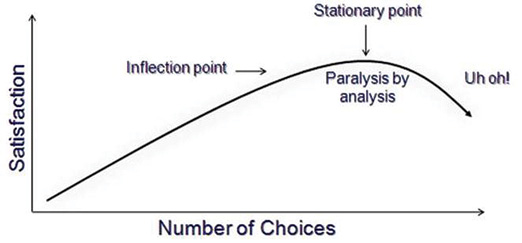
I decided that at least one schedule should be added to the article so that it looks like I know what I'm talking about
. First of all, I tried to create something like a support group. It was a Slack channel with a small group of friends working on or completing their indie projects. We wrote questions / articles / reviews and chatted through Google hangout once a week. This support group turned out to be useful in concretizing the concept, so that I would not have to completely trust only my instincts.
It is worth mentioning - for the sake of your mental health, choose a concept that you really like! Of course, you probably want the game to be financially viable in the market, to be technically feasible, and so on, but creating a game is incredible, insanely difficult! Over time, you will become tired, exhausted, and lack motivation. If you are fueled by the idea that you are working on the coolest thing that you could invent, it will help you stay focused.
I was always interested in climbing, and I had an interesting idea for a hook-cat control system, so I began to create a prototype of a game about extreme mountaineering.
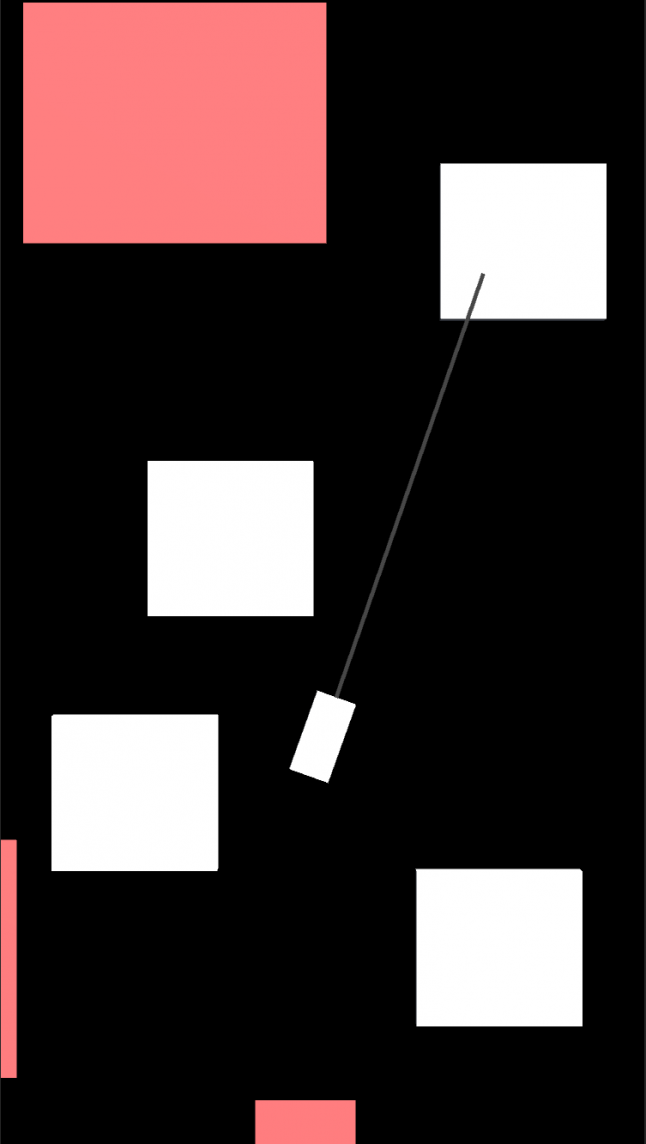
It may look simple, but you have to start somewhere!
After a month or so, I realized that working on my own, without a team, is very lonely.
Loneliness

A solo game developer can be just as lonely, but without stunning views.
There are several aspects that affect how lonely you feel when working on a project:
- You do not work with other people on a common goal.
- Physically alone at the place of their work.
- You are alone after the end of the working day.
The absence of colleagues means that you get the zero support and motivation that you usually get when investing in a project with other people.
If you work at home, you will usually be alone during the day. When I decided to start my project, I moved to another city, mainly to save money. This meant that it took me a while to create social connections, and sometimes there was a time when I literally stayed one whole day, and sometimes several days in a row! I started to go a little crazy. To cope with this, I decided to plan my week so as to get out of the house and meet people at least once a day.
I also started attending coworking. This is the place where you sit and work in a room filled with random people. I did not want to spend money on renting the entire room, so I found several groups of coworkers on meetup.com that were free and just worked in a cafe.
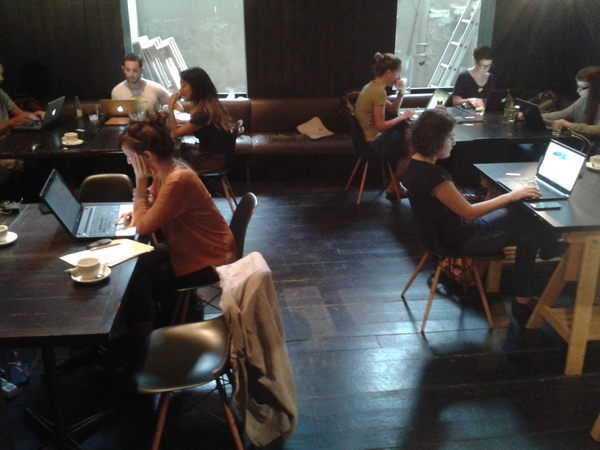
I go here once a week just to stop going crazy
Strange, but when there are people around you, you have a stronger sense of motivation, even if they don’t invest in your work! As for motivation, you will need it as much as possible.
Lack of motivation
Work without a team greatly affects motivation. And when you work alone, no one will tell you that it's time to stop watching kittens videos on YouTube. Sometimes the Toggl website came in handy. He was recommended to me by Ryan Darcy, who has an amazing post explaining the meaning of Toggl and telling about many other things: Making Moves .

Toggl is the best way to get yourself to work more hours.
Toggl is the simplest timer that you turn on at the beginning of work and turn it off when you finish, and then write a description of what you did. This creates the feeling of needing to focus on work when the timer is ticking.
In addition to distracting aspects and problems with motivation, there is your overall satisfaction from working on the project. When creating a game, some of the tasks are interesting and creative, while others are boring and boring. But it doesn’t matter - if you work alone, you have to do ALL of them. You will have periods of low motivation, but there will be no team that could raise it.
A few months later, when my motivation fell a bit, it turned out to be very useful to show the game to other people. It helped a lot, not only allowed us to get feedback from people with a fresh look, but also provided incredible support: watching how someone enjoys your work is very motivating.
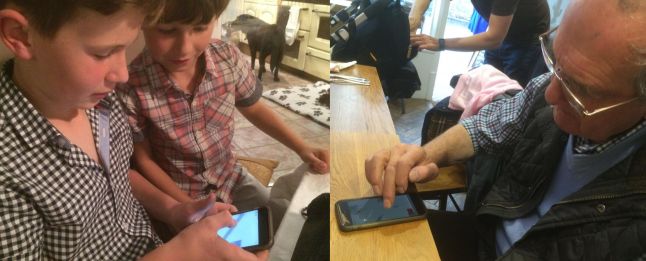
Even my father played in the Hang Line, but he is already 84!
It is worth noting that at that stage the game looked like this:
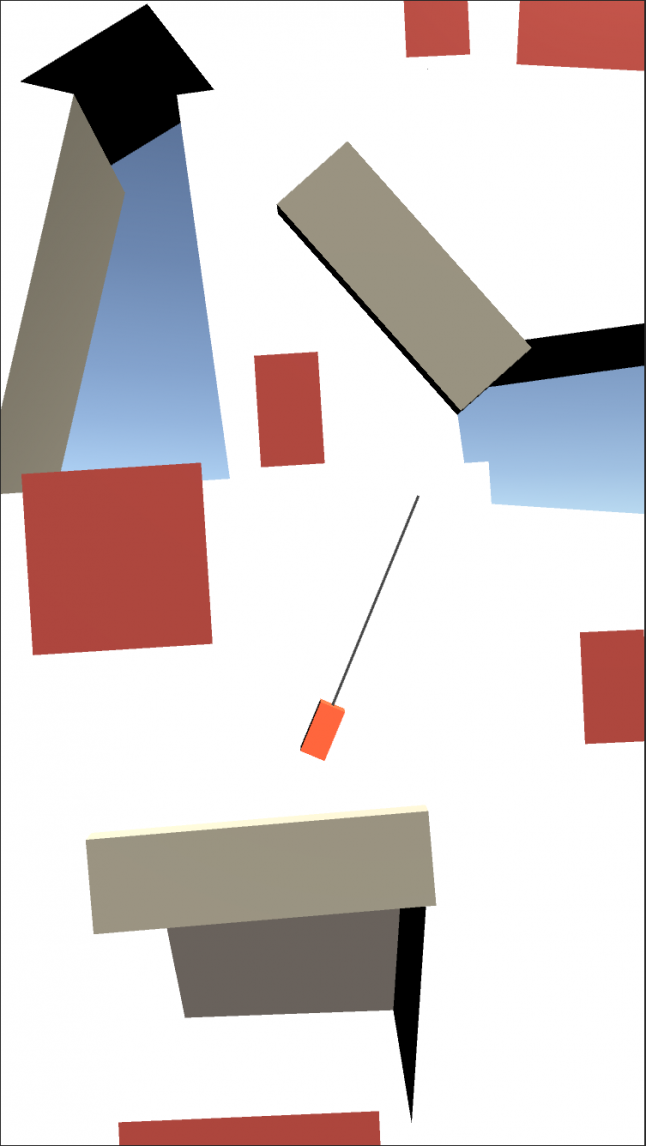
Swing, avoid red objects, or die. That's all I had at that time.
Those. complete garbage. But it is not important. Do not be shy. If you have something to play, then let people play. Other people will have a different look. Believe it or not, but at this stage, the people who played the game asked where it can be downloaded, but then I only had a die instead of the main character!
I also joined a group of local indie developers, so I could watch someone else besides my friends and family play the game, which is useful for getting less biased reviews.
At this stage, my motivation was quite strong, but I began to worry very much about money ...
Anxiety
When you work for a company, your project usually has a deadline. But if the team skips this deadline, then you still usually get paid and work continues. When you work on the game alone, your deadline is essentially “savings” that are deferred for expenses. When they are exhausted, this all ends. This means that even when you are not working, you always think about time and money.
Decisions must be made. Should I travel with friends? Do I have to buy a new TV? Can choose beer instead of an expensive cocktail? Very quickly you can get to the little things. I found that I was worried a lot about small decisions simply because I was not used to surviving on savings.

Too worried about money and about having to eat noodles every day.
The best solution for me was a little planning and assignment of a reasonable weekly budget, depending on the total savings set aside for the project, and on the time I spend on it. Thus, the money turns out to be “already spent”, so this makes you not so much stressed about small decisions. And yet - I know, you have heard this a thousand times, but I repeat, because it is important - do not lay a budget for the project, lay a double budget for the project. I set aside money for two games and all my time was taken by only one.
After creating a budget and planning, I began to advance more actively in the project. Pretty soon, I got the feeling that the basic gameplay is good enough, and I began to switch from prototype to production.
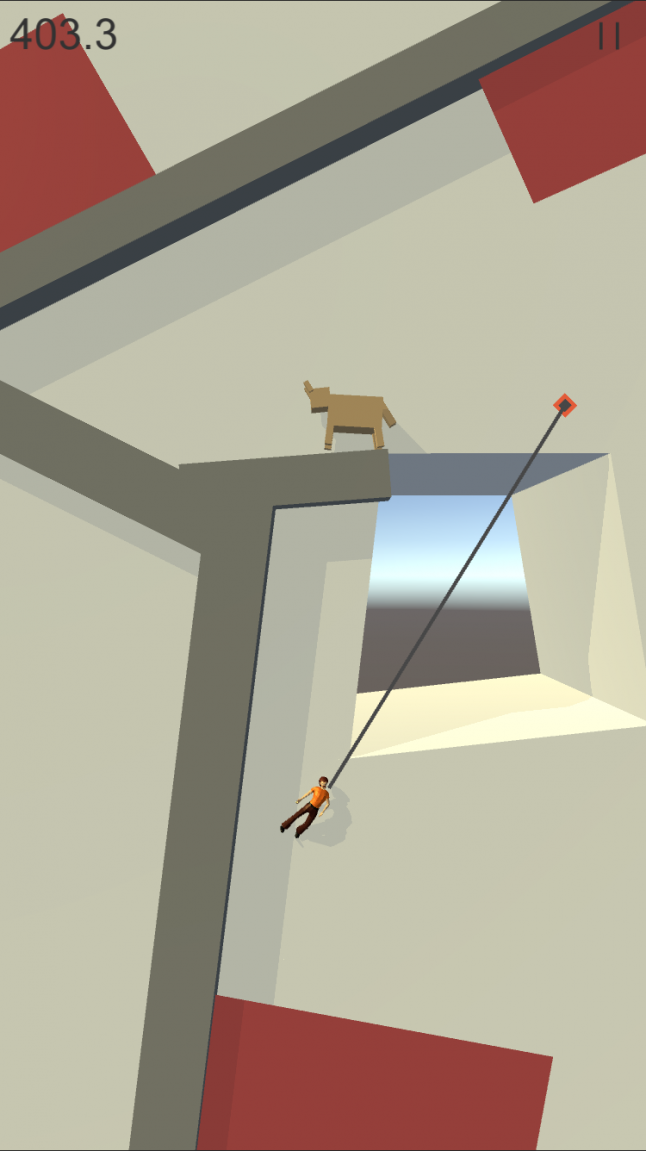
Still not too impressive, but at least I replaced the cube!
But at about that moment, really difficult tasks started to arise for me, which took a lot of time. There is an ancient saying that the last 20% of the work takes 80% of the time. The problem is that when creating a prototype and throwing ideas, it seems to you that the game is moving very fast. But when you move on to tasks such as adding release graphics, bringing gameplay systems to a release state, you begin to feel like you're moving at a snail's speed. I began to doubt that in fact I could manage to finish the game on time ...
Diffidence
If there is one word that I never want to hear again, it is “Indipocalypse” (Indiepocalypse).

Obviously, we are all doomed, and it’s very useful to know when you are torn to complete your first game alone.
Each damn week there is a new article about failed sales on Steam, failed campaigns on Kickstarter, billions of games released weekly for mobile, incredible difficulties with gaining popularity ... As if creating a quality game in itself is not complicated enough. The last thing I want to know is that all my efforts are meaningless and I have no chance of success!
I noticed that when creating the game alone I feel that my work is actually unrealistic. I still needed to understand a bunch of technical aspects, for example, how to provide sufficiently high performance on mobile, quickly create level graphics, etc. I had a feeling that I was mumbling around and literally I couldn’t manage to finish the game on time. And what drove me even more depressed was the idea that even if this happens, no one will notice her and she will not interest anyone except me, sitting alone at the programming room. The game does not exist in any other reality.
Instability
When you work at a regular job, you have many factors that influence your mood - relationships with colleagues, praise from management (or lack thereof), a new bonus scheme in the company, etc. When you work alone, you only have a game and the process of creating it. And that’s it. Therefore, when it seems that things are not going very well, it is very frustrating.

I heard that if you add a picture with a cat, then the audience of readers of any article increases by 500%
I realized that my mood and general condition / satisfaction strongly depend on what I do on a particular day and how the process is progressing. Therefore, my mood was very hesitant. I realized that the best way to deal with this would be to make my life outside of work balance everything a bit. I started attending a writing club, which distracted me well and allowed me to think about something other than work.
Despite this, at the stage of two-thirds of the project, I began to worry very much about what I was going to, because I had already spent more time than I had planned for the whole game.
Fear of failure
Initially, I planned to spend 3-6 months on the game, but after 9 months it was obvious that there was still a lot of work. The problem was that my goals and expectations shifted. I have already invested more money in the game, because I worked on it longer, so I stopped perceiving it as the first attempt on which you can learn. She turned into something that, as I hoped and even waited, could bring me some money. And if this did not succeed, I would be much more upset.
In fact, I was increasing and increasing the bet on the gaming table, which, of course, could bring me greater winnings, but with the same frightening chances of winning. And I don’t like gambling at all!

Spending part of your savings on creating a video game is essentially a gamble
At this stage, the project moved very slowly. When you work on a project for a year, the code base becomes so large that any addition, no matter how simple, can affect many other systems. Even remembering how a piece of code that you wrote about a year ago works can be very difficult. Therefore, it is so important to document your code - sometimes I read the comments and did not remember how I wrote them. It seemed like some version of Marty McFly from the past was telling me about the future ...
Also, looking at old screenshots and videos helps to cope with problems. If you save a screenshot or video somewhere before adding new features to the game, then with time you will get a clear visualization of the development process of the entire game. Looking at it and realizing how far the game has progressed, you will always feel much better and will understand what a long way you have come.
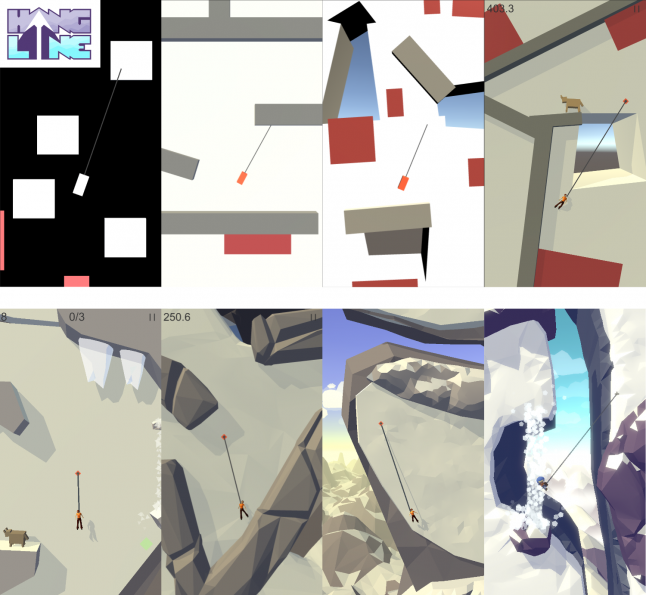
Take a trip back in time to develop your game and realize how amazing it is.
Conclusion
This story is not over yet. I've been working on my Hang Line game for about a year now, and it's still not ready. But recently, my motivation has grown dramatically. I finally started taking steps on PR and sharing the game on twitter, facebook, etc. I recorded the trailer and got a lot of media attention, which really influenced me. I felt that the game is something real, and that people like it.
Therefore, my last recommendation is to start sharing your work with the world as early as possible. Evaluating your game by random people provides HUGE help.
You should not think about it only from the point of view of PR. Chat with other developers. There are great bands on facebook like Indie Game Dev Groupin which people give honest and helpful feedback. Don't be afraid and just get in touch with developers who have released games similar to yours, just to ask for tips or recommendations. I had only the most positive feelings from such communication. People who did not know about the game before came to my aid, and this greatly influenced both the game itself and motivation.
If interested, you can watch the trailer I recently published:
And if you want to know how this story ends, subscribe to the newsletter on my website: www.hanglinegame.com
Making the game alone is incredibly difficult. If you are thinking about starting such a journey, I hope my article will clarify some of the problems. If you are already on the path to creating a game, then perhaps it will be useful to you. Hold on! Whatever you do, bring it to the end and learn from your own experience.
Good luck
